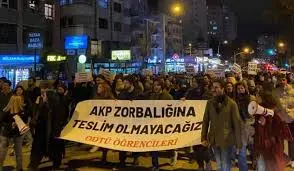Protests and Economic Turmoil: Turkey Faces Crisis After Arrest of Opposition Leader
In recent weeks, Turkey has plunged into political and economic turmoil following the arrest of a prominent opposition leader. The incident has sparked widespread protests across the nation, with citizens voicing their anger over the government’s growing authoritarianism and political repression. At the same time, investors are fleeing the country in fear of an unstable future, exacerbating the already fragile economic situation.
The Arrest That Shook Turkey
The arrest of the opposition leader has been a tipping point for the already volatile political climate in Turkey. The leader, known for his vocal criticism of the government, was taken into custody under accusations of attempting to undermine the state and incite unrest. Critics argue that the charges are politically motivated, designed to suppress dissent and weaken opposition parties ahead of upcoming elections.
This event comes at a time when Turkey is already struggling with increasing polarization and a deepening economic crisis. With high inflation, rising unemployment, and a falling currency, the country’s economic stability is hanging by a thread. Many believe the arrest is not just a political maneuver, but also a strategy to divert attention from the government’s economic mismanagement and to consolidate power in the hands of President Recep Tayyip Erdoğan.

Protests Erupt Across the Country
The arrest has sparked a wave of protests in major cities, with demonstrators calling for the immediate release of the opposition leader and condemning the government’s actions. These protests have been met with heavy police presence, and clashes between protesters and law enforcement have led to dozens of injuries. The unrest has spread to both urban and rural areas, with many citizens expressing their frustration over the lack of political freedoms and the worsening economic conditions.
The protests are a clear indication that the people of Turkey are growing disillusioned with the government’s policies. As the political environment becomes increasingly repressive, more and more citizens are speaking out, despite the risks. Human rights organizations have raised concerns about the crackdown on dissent, with reports of arrests and harassment of journalists, activists, and political opponents.
Investor Flight and Economic Concerns
The political crisis has also triggered widespread concern among investors. As protests intensify and the government’s grip on power grows tighter, foreign investors are pulling their capital out of Turkey at an alarming rate. The Turkish lira has weakened further against major currencies, and the country’s stock market has seen significant declines.
Turkey’s already fragile economy is heavily reliant on foreign investment, and the outflow of capital is putting even more strain on the country’s financial system. The economic uncertainty has led to skyrocketing inflation, making everyday goods and services increasingly unaffordable for ordinary citizens. The situation is further compounded by high levels of national debt, which has left the government with little room to maneuver.
The government’s handling of the economic crisis has been heavily criticized, with many economists arguing that President Erdoğan’s policies have exacerbated the situation. Despite repeated calls for economic reforms, the government has maintained its stance on unorthodox economic policies, including lowering interest rates in the face of soaring inflation. This approach has fueled concerns that Turkey’s economy is on the brink of collapse.

The Global Implications
The political and economic crisis in Turkey has implications not just for the country, but for the broader region and global markets. As a NATO member and a key player in the Middle East, Turkey’s instability could have far-reaching consequences for security and trade. The unrest could also lead to further geopolitical tensions, especially with neighboring countries already dealing with their own political and economic challenges.
Moreover, Turkey’s economic struggles could affect global markets, especially those in Europe, where Turkish businesses and investors have significant interests. The flight of capital from Turkey could also impact global financial systems, particularly if investors begin to view emerging markets as increasingly risky.
Looking Ahead
The situation in Turkey remains uncertain. While the government is unlikely to reverse its stance on the opposition leader’s arrest, the continued unrest and economic instability could force President Erdoğan to reconsider his policies. However, the growing discontent among the Turkish population and the international community’s scrutiny of the government’s actions suggest that the country’s political crisis may not end anytime soon.
For now, Turkey faces a fragile future, with protests and economic turmoil threatening to plunge the nation into deeper crisis. Whether the government will address the underlying issues, or whether the protests will escalate into a broader movement for change, remains to be seen. What is clear, however, is that the arrest of the opposition leader has set in motion a series of events that will shape Turkey’s political and economic landscape for years to come.




